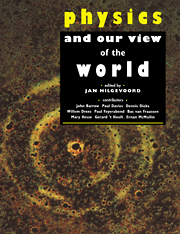Book contents
- Frontmatter
- Contents
- Foreword
- Introduction
- 1 Questioning the answers or Stumbling upon good and bad Theories of Everything
- 2 Theories of Everything
- 3 The scientific view of the world: introduction
- 4 Enlarging the known world
- 5 The world of empiricism
- 6 Has the scientific view of the world a special status compared with other views?
- 7 Quantum theory and our view of the world
- 8 Interpretation of science; science as interpretation
- 9 Problems in debates about physics and religion
- 10 The mind of God
- 11 The sources of models for God: metaphysics or metaphor?
- Discussion
- Notes on contributors
- Bibliography
- Index
6 - Has the scientific view of the world a special status compared with other views?
Published online by Cambridge University Press: 04 December 2009
- Frontmatter
- Contents
- Foreword
- Introduction
- 1 Questioning the answers or Stumbling upon good and bad Theories of Everything
- 2 Theories of Everything
- 3 The scientific view of the world: introduction
- 4 Enlarging the known world
- 5 The world of empiricism
- 6 Has the scientific view of the world a special status compared with other views?
- 7 Quantum theory and our view of the world
- 8 Interpretation of science; science as interpretation
- 9 Problems in debates about physics and religion
- 10 The mind of God
- 11 The sources of models for God: metaphysics or metaphor?
- Discussion
- Notes on contributors
- Bibliography
- Index
Summary
Dennis Dieks, in Chapter 3, sketches a framework which, he says, has guided the work of many physicists. He implies that the remaining conflicts are a purely philosophical phenomenon. Being fond of quarrels philosophers have split into schools. There are now empiricists, positivists, rationalists, anarchists, realists, apriorists, pragmatists and they all have different views about the nature of science. Scientists, on the other hand, collaborate. Collaboration creates uniformity and, with it, a single way of looking at things: it does make sense to ask about the status of the scientific world-view.
In contrast I want to argue that scientists are as contentious as philosophers. But while philosophers merely talk, scientists act on their convictions; scientists from different areas use different procedures and construct their theories in different ways. Moreover, they often succeed: the world-views we find in the sciences have empirical substance. This is a fact, not a philosophical position. I shall explain it by considering the following four questions:
What is the scientific view of the world and is there a single such view?
Assuming there is a single scientific world-view — for whom is it supposed to be special?
What kind of status are we talking about? Popularity? Practical advantages? Truth?
What ‘other views’ are being considered?
My answer to the first question is that the wide divergence of individuals, schools, historical periods and entire sciences makes it difficult to identify comprehensive principles either of method, or of fact.
- Type
- Chapter
- Information
- Physics and our View of the World , pp. 135 - 148Publisher: Cambridge University PressPrint publication year: 1994
- 3
- Cited by

